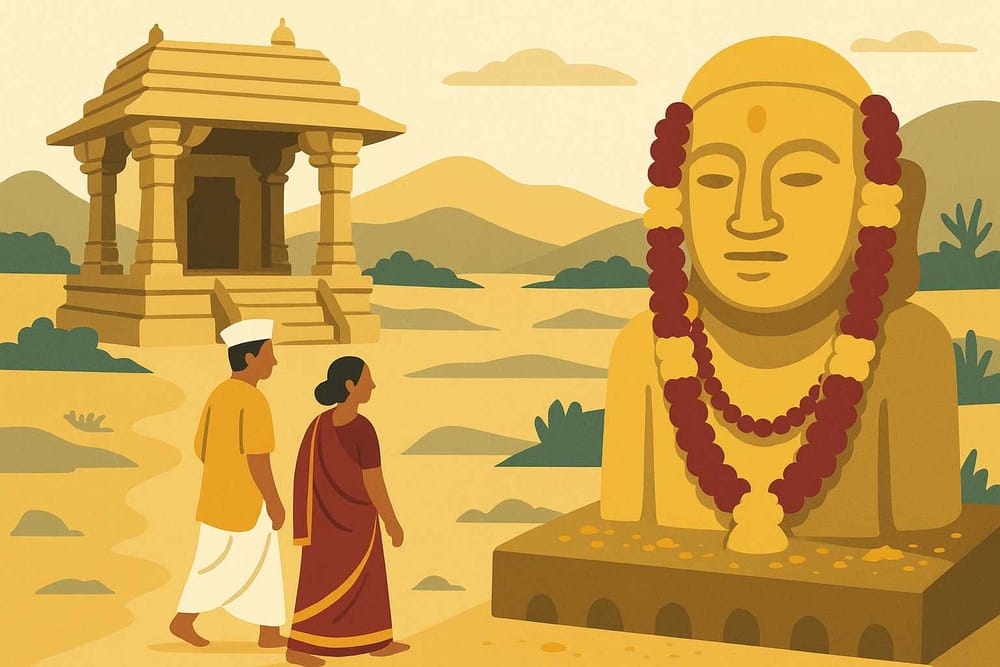
Exploring Symbolism-Themes in 'Jejuri'-Arun Kolatkar
Have you ever stood in a holy place, the air thick with the scent of incense and marigolds, and felt a strange mix of deep reverence and a quiet, nagging doubt? It’s a feeling many of us know well—that space between unwavering faith and the questions our modern minds ask. This is the very heart of Arun Kolatkar’s timeless collection of poems, ‘Jejuri’. It’s not just poetry; it’s a journey, a conversation with ourselves about what it means to believe in a world full of contradictions.
Kolatkar takes us by the hand on a bus ride to the temple town of Jejuri in Maharashtra, a place dedicated to the folk deity Khandoba. But this isn't your typical pilgrimage guide. It's a raw, honest, and sometimes funny look at spirituality through the eyes of a skeptical visitor. It’s a journey that speaks volumes to us today, as we try to balance our rich heritage with our fast-paced lives.
Jejuri: More Than Just a Place on a Map
To understand Kolatkar’s masterpiece, you first need to feel the dust of Jejuri under your feet. It’s a town of stark contrasts. On one hand, you have the vibrant, unshakeable faith of the pilgrims, their voices chanting praises to Khandoba. On the other, you see the reality of the place—the rugged, barren hills, the crumbling temple stones, and the general wear and tear of time.
Kolatkar doesn’t just describe the scenery; he makes it a character in his story. The harsh sun, the long shadows, the ancient shrines—they all whisper tales of devotion and decay coexisting. This blend of the sacred and the ordinary is something we see in so many of our holy places. It reminds us that faith isn’t lived in a pristine vacuum; it’s lived amidst the chaos and beauty of everyday life. This feeling isn't unique to Jejuri; you can sense similar echoes of divinity in Udaipur's sacred corners, where ancient devotion breathes in a modern city.
Unpacking the Symbols: The Hidden Language of Jejuri
What makes 'Jejuri' so powerful is Kolatkar's ability to find deep meaning in the simplest things. He uses symbols not as complicated puzzles, but as windows into the soul of the place and its people.
- The Dilapidated Temple and its Door: The crumbling state of the shrines isn't a sign of lost faith for Kolatkar. Instead, the 'Heart of Ruin' becomes a symbol for the very complexity of spirituality. The famous poem about the temple door, which has no knobs and is latched from the outside, beautifully captures the decay of organized religion, suggesting that perhaps true divinity cannot be locked away inside four walls.
- The Butterfly and the Rocks: Amidst the stark, rocky landscape that symbolizes life's struggles, Kolatkar spots a single butterfly. This small, vibrant creature becomes a powerful celebration of life, existence, and even mortality. It's a reminder that beauty and hope can be found even in the harshest of environments, a profound lesson for all of us.
- Priests, Guides, and Offerings: Kolatkar observes the human side of religion with a sharp, yet gentle eye. The priest who appears in a flash and vanishes just as quickly, the guide who rattles off legends as a job—these characters highlight the intersection of genuine faith and routine commerce. It’s a theme that resonates deeply in today's world, where spirituality and consumerism often walk hand-in-hand.
The Great Indian Dialogue: Faith, Skepticism, and Modernity
At its core, 'Jejuri' explores the internal conflict between belief and disbelief. The narrator isn't dismissive of the pilgrims' faith; he's an observer, trying to understand it while honouring his own rational mind. This is a journey so many modern Indians undertake—we deeply respect our traditions, but we also question them. Kolatkar gives a voice to this beautiful, confusing, and ultimately human experience.
The poem brilliantly captures the dance between tradition and modernity. Ancient rituals are performed next to a sputtering state transport bus. This isn’t a battle, but a reflection of India itself, where the old and the new are constantly weaving new patterns together. Kolatkar asks us to consider how our own cultural identity is shaped by this ongoing conversation between our roots and our modern lives.
Why 'Jejuri' is a Treasure for Our Times
Arun Kolatkar’s work is more than just literature; it is a cultural touchstone. By focusing on a regional deity like Khandoba and the unique traditions of Maharashtra, he helps preserve a slice of our diverse heritage. His use of simple, almost conversational English, peppered with local flavour, makes the experience accessible to everyone, inviting us to reflect on our own connection to faith.
For those of us navigating our careers, families, and personal growth, 'Jejuri' serves as a comforting reminder that it's okay to have questions. It teaches us that spirituality isn't about having all the answers, but about being present in the journey. It encourages us to find our own meaning, whether it’s in a grand temple like those found while exploring Pushkar's spiritual heart or in the flutter of a butterfly's wings.
Preserving such profound explorations of our culture is at the core of what we do at Bhaktilipi. We believe that timeless works like 'Jejuri' deserve a special place in our hearts and minds. At Bhaktilipi.in, we are dedicated to bringing you the essence of devotional literature and stories, reimagined for today's reader, helping you stay connected to your spiritual roots in a meaningful way.
A Final Thought on Our Own Pilgrimage
Arun Kolatkar’s ‘Jejuri’ isn’t just about a trip to a temple town; it's about the pilgrimage we all take within ourselves. It validates our doubts, celebrates our faith, and finds beauty in the imperfect, messy reality of life. It teaches us to look closer, to see the divine not just in the idol, but in the cracks in the stone, the faith in a stranger's eyes, and the questions in our own hearts.
As you go about your day, let the spirit of 'Jejuri' be a gentle guide. Embrace the beautiful complexities of your own beliefs and traditions. After all, the most sacred journey is the one that leads to a deeper understanding of ourselves.
Stay connected with us for more such reflections on our rich heritage:
A passionate group of people dedicated to preserving India's knowledge of Dharma, Karma, and Bhakti for ourselves and the world 🙏.
